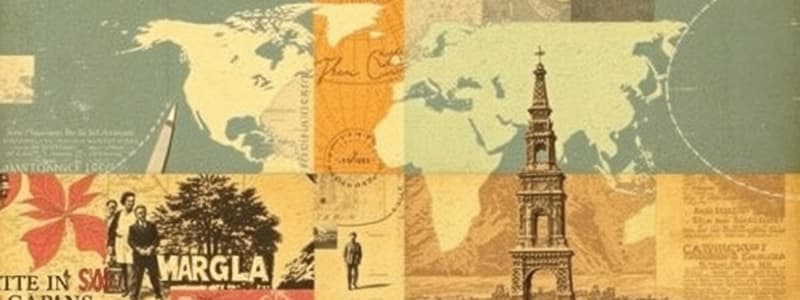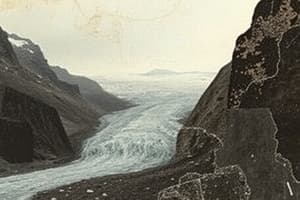Podcast
Questions and Answers
Geography is considered both a natural and social science due to its focus on:
Geography is considered both a natural and social science due to its focus on:
- understanding the earth's physical features and human societies. (correct)
- the study of ancient civilizations and their map-making techniques.
- the development of cartography and map projections throughout history.
- the use of advanced technologies like GPS and GIS.
The evolution of geography tools from Babylonian clay tablets to modern GPS and GIS demonstrates a shift towards:
The evolution of geography tools from Babylonian clay tablets to modern GPS and GIS demonstrates a shift towards:
- a simplification of geographic studies to focus solely on natural features.
- a decreased reliance on maps for location finding.
- a greater emphasis on manually drawn maps and projections.
- an increased capacity for data integration and location analysis. (correct)
Why is the Mercator projection, despite being developed in the 16th century, still relevant in modern cartography?
Why is the Mercator projection, despite being developed in the 16th century, still relevant in modern cartography?
- Because it is the only projection capable of depicting both natural and man-made features.
- Because its digital form is essential for GPS technology.
- Because some form of it continues to be used in contemporary maps. (correct)
- Because it is the most accurate representation of the Earth's shape and size.
If GPS primarily provides location data, what is the key advancement that GIS offers beyond GPS?
If GPS primarily provides location data, what is the key advancement that GIS offers beyond GPS?
The diminishing need for people to learn traditional map reading skills is primarily a consequence of the widespread use of:
The diminishing need for people to learn traditional map reading skills is primarily a consequence of the widespread use of:
Flashcards
Geography
Geography
The study of the Earth's physical and social aspects.
Cartography
Cartography
The art and science of creating maps.
Mercator Projection
Mercator Projection
A map projection created in 1570 that is still used today.
Global Positioning System (GPS)
Global Positioning System (GPS)
Signup and view all the flashcards
Geographic Information System (GIS)
Geographic Information System (GIS)
Signup and view all the flashcards
Study Notes
- Geography is both a natural and social science
- Geographers study the earth's physical aspects and social phenomena like cities and human populations.
- Cartography, or map-making, is an ancient science
- Geography tools have evolved since the Babylonians etched maps into clay tablets 4,300 years ago
- Many maps still use a form of the Mercator projection developed in 1570 by Gerardus Mercator
- Maps depict natural features, such as mountains, and man-made features, such as roads and borders
- GPS (Global Positioning System) calculates the location of objects by measuring the frequency of radio signals from satellites
- GIS (Geographic Information System) builds on GPS data to integrate maps and other types of information
- GIS tools enable people to communicate and share location-based data effectively among scientists and researchers
Studying That Suits You
Use AI to generate personalized quizzes and flashcards to suit your learning preferences.
Description
Geography encompasses both natural and social sciences, studying Earth's physical aspects and social phenomena. Cartography, an ancient science, has evolved from clay tablets to modern GPS and GIS technologies. These tools enable effective communication and data sharing among scientists and researchers.




